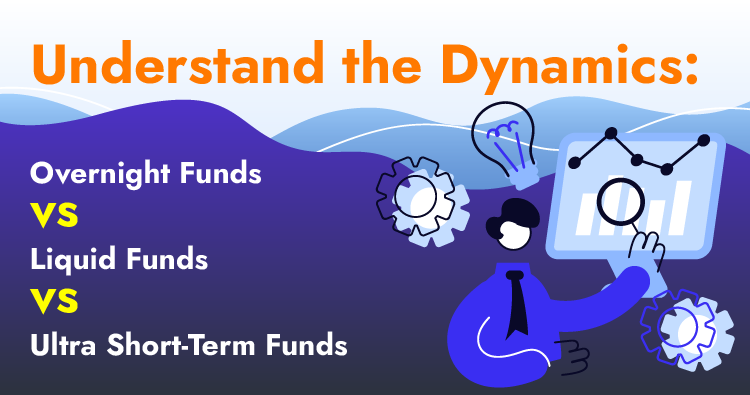




Understand the Dynamics: Overnight Funds vs. Liquid Funds vs. Ultra Short-Term Funds
When it comes to parking your surplus cash or optimizing your investments for short-term gains, navigating the realm of mutual funds can be both enticing and perplexing. Among the plethora of options available, overnight funds, liquid funds, and ultra short-term funds stand out as popular choices for investors seeking liquidity and stability.
In this blog post, we'll delve into the nuances of these three types of mutual funds, comparing their features, risks, and potential returns to help you make informed decisions regarding your investment strategy.
Overnight Funds: Embracing the Ephemeral
What Are They?
Overnight funds represent the newest entrant in the mutual fund universe, introduced in recent years to cater to investors seeking ultra-short duration investments. These funds invest in securities with a single day maturity, such as overnight repos and CBLOs (Collateralized Borrowing and Lending Obligations), offering the highest level of liquidity and minimal credit risk.
Key Features:
Minimal Interest Rate Risk: Overnight funds invest in securities with extremely short maturities, effectively eliminating interest rate risk from the equation.
Ultra-High Liquidity: Investors can redeem their units on a daily basis, providing unparalleled liquidity for short-term cash management needs.
Lower Returns: While offering superior liquidity and safety, overnight funds typically yield lower returns compared to liquid and ultra short-term funds, making them suitable for ultra-short-term parking of funds.
Liquid Funds: The Steady Anchors
What Are They?
Liquid funds are open-ended debt mutual funds that invest in short-term money market instruments such as treasury bills, certificates of deposit, and commercial paper, with maturities of up to 91 days. They are known for their high liquidity and low volatility, making them an ideal choice for parking surplus cash for short durations.
Key Features:
Low Risk: Liquid funds primarily invest in instruments with short maturities, reducing the risk of interest rate fluctuations.
High Liquidity: Investors can redeem their units at any time, usually within 24 hours, making liquid funds suitable for emergency funds or short-term financial goals.
Stable Returns: Liquid funds offer relatively stable returns with lower volatility compared to other debt funds.
Ultra Short-Term Funds: Balancing Act
What Are They?
Ultra short-term funds, as the name suggests, invest in fixed-income securities with slightly longer maturities than liquid funds, typically ranging from 3 months to 1 year. They strike a balance between higher returns and moderate risk, appealing to investors seeking slightly higher yields while maintaining liquidity.
Key Features:
Moderate Risk: Ultra short-term funds carry slightly higher risk than liquid funds due to their longer average maturity, but they still aim to minimize interest rate risk by investing in short to medium-term debt securities.
Potential for Higher Returns: With a longer investment horizon, ultra short-term funds have the potential to generate better returns than liquid funds, albeit with slightly more volatility.
Suitable for Short-Term Goals: Investors with short to medium-term financial goals can consider ultra short-term funds for parking funds while aiming for better returns than traditional savings accounts or fixed deposits.
Conclusion: Tailoring Your Strategy
Choosing between liquid funds, ultra short-term funds, and overnight funds boils down to your investment horizon, risk appetite, and liquidity requirements.
Overnight funds cater to those seeking ultra-short duration investments with unparalleled liquidity and minimal risk.
Liquid funds are ideal for short-term cash management and emergency funds, offering high liquidity and low risk.
Ultra short-term funds strike a balance between risk and return, making them suitable for investors with slightly longer investment horizons.
Ultimately, a diversified approach incorporating a mix of these funds based on your financial goals and risk tolerance can help optimize your short-term investment strategy while safeguarding your capital. As always, it's crucial to consult with a professional fund manager to align your investments with your specific needs and circumstances.
This blog is purely for educational purposes and not to be treated as personal advice. Mutual Fund investments are subject to market risks, read all scheme related documents carefully.
B INVESTMENTS,
Millenia Business Park-II,
Perungudi, Chennai, Tamil Nadu-600096
helpdesk@binvestments.in
Copyright © B Investments. All rights reserved.
